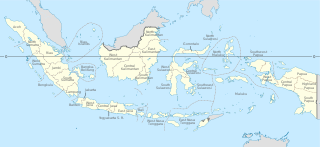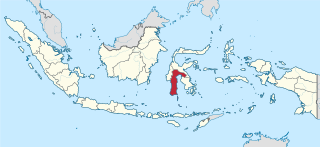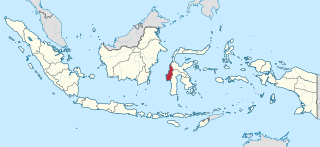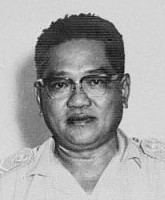Governors of North and Central Sulawesi
| # | Photo | Name | Took office | Left office | Notes |
|---|---|---|---|---|---|
| 1 |  | 1960 | 1962 | [2] | |
| 2 |  | 15 June 1962 | 23 September 1964 | Was acting governor until 27 July 1962 [3] : 195 |
The province of North and Central Sulawesi was a province in Indonesia that was short-lived, lasting only four years from 1960 to 1964. It was established as part of the separation of the province of Sulawesi into the province of North and Central Sulawesi and the province of South and Southeast Sulawesi. In 1964, the province of North and Central Sulawesi was separated into the province of North Sulawesi and the province of Central Sulawesi. [1]
| # | Photo | Name | Took office | Left office | Notes |
|---|---|---|---|---|---|
| 1 |  | 1960 | 1962 | [2] | |
| 2 |  | 15 June 1962 | 23 September 1964 | Was acting governor until 27 July 1962 [3] : 195 |

Sulawesi, also known as Celebes, is an island in Indonesia. One of the four Greater Sunda Islands, and the world's eleventh-largest island, it is situated east of Borneo, west of the Maluku Islands, and south of Mindanao and the Sulu Archipelago. Within Indonesia, only Sumatra, Borneo, and Papua are larger in territory, and only Java and Sumatra have larger populations.

Provinces of Indonesia are the 38 administrative divisions of Indonesia and the highest tier of the local government. Provinces are further divided into regencies and cities, which are in turn subdivided into districts (kecamatan).

Central Sulawesi is a province of Indonesia located at the centre of the island of Sulawesi. The administrative capital and largest city is located in Palu. The province borders the provinces of Gorontalo to the east, Southeast Sulawesi, South Sulawesi, and West Sulawesi to the south, and sharing maritime borders with East Kalimantan to the west, North Maluku to the east, and Malaysia and the Philippines to the north. The 2010 census recorded a population of 2,635,009 for the province, and the 2020 Census recorded 2,985,734, of whom 1,534,706 were male and 1,451,028 were female. The official estimate as at mid 2022 was 3,066,143. Central Sulawesi has an area of 61,605.72 km2 (23,786 sq mi), the largest area among all provinces on Sulawesi Island, and has the second-largest population on Sulawesi Island after the province of South Sulawesi. It is bordered by the provinces of Gorontalo to the north, West Sulawesi, South Sulawesi and South East Sulawesi to the south, by Maluku to the east, and by the Makassar Strait to the west. The province is inhabited by many ethnic groups, such as the Kaili, Tolitoli, etc. The official language of the province is Indonesian, which is used for official purposes and inter-ethnic communication, while there are several indigenous language spoken by the Indigenous peoples of Central Sulawesi. Islam is the dominant religion in the province, followed by Christianity which is mostly adhered to by the people in the eastern part of the province.

South Sulawesi is a province in the southern peninsula of Sulawesi, Indonesia. The Selayar Islands archipelago to the south of Sulawesi is also part of the province. The capital and largest city is Makassar. The province is bordered by Central Sulawesi and West Sulawesi to the north, the Gulf of Bone and Southeast Sulawesi to the east, Makassar Strait to the west, and Flores Sea to the south.

Poso is the administrative capital of Poso Regency, Indonesia. It is the main port and transportation hub for the central-southern coast of Central Sulawesi. Its urban area consists of three districts, Poso Kota, North Poso Kota, and South Poso Kota. Poso lies in the middle of the province on the shore of the Gulf of Tomini, right in the central part of Sulawesi island. With a total population of 47,477 in 2020, it is one of the biggest and the oldest towns in the province.

North Sulawesi is a province of Indonesia. It is located on the Minahasa Peninsula of the island of Sulawesi, south of the Philippines and southeast of Sabah, Malaysia. It borders the Philippine province of Davao Occidental and Soccsksargen regions of the Philippines to the north, the Maluku Sea to the east, Gorontalo and Celebes Sea to the west and the Gulf of Tomini to the southwest. With the outlying island of Miangas to its north, it is the northernmost island of Indonesia. The province's area is 14,500.28 square kilometres (5,598.59 sq mi), and its population was 2,270,596 according to the 2010 census; this rose to 2,621,923 at the 2020 Census, while the official estimate as at mid 2022 was 2,659,543. North Sulawesi is known as a heaven for divers around the world.

Southeast Sulawesi is a province on the island of Sulawesi, forming the southeastern peninsula of that island, together with a number of substantial offshore islands such as Buton, Muna, Kabaena and Wawonii, together with many smaller islands. It is bordered by South Sulawesi and Central Sulawesi to the north, sharing a maritime border with Maluku and North Maluku to the east and East Nusa Tenggara to the south, as well a very narrow maritime border with East Timor to the south. The capital is the city of Kendari, on the east coast of the peninsula.

The Minahasans are an indigenous ethnic group from the North Sulawesi province of Indonesia, formerly known as North Celebes. The Minahasa people sometimes refer to themselves as Manado people. Although the Minahasan pre-Christian creation myth entails some form of ethnic unification, before the nineteenth century the Minahasa region was in no way unified. Instead, a number of politically independent groups (walak) existed together, often in a permanent state of conflict.

West Sulawesi is a province of Indonesia. It borders the provinces of South Sulawesi and Central Sulawesi to the east, Makassar Strait to the west, and the Pacific Ocean to the south. The province also shares maritime borders with East Kalimantan and South Kalimantan to the west and West Nusa Tenggara to the south. It is located on the western side of Sulawesi island. It covers an area of 16,594.75 km2, and its capital is the town of Mamuju. The 2010 Census recorded a population of 1,158,651, while that in 2020 recorded 1,419,228; the official estimate as at mid 2022 was 1,458,606.

Minahasa Regency is a regency in North Sulawesi, Indonesia. Its capital is Tondano. It covers an area of 1,141.64 km2 and had a population of 310,384 at the 2010 Census; this rose to 347,290 at the 2020 Census, and the official estimate as at mid 2022 was 350,317.

The Greater Sunda Islands are four tropical islands situated within the Indonesian Archipelago, in the Pacific Ocean. The islands, Borneo, Java, Sulawesi and Sumatra, are internationally recognised for their ecological diversity and rich culture. Together with the Lesser Sunda Islands to their southeast, they comprise the archipelago known as the Sunda Islands.

Gorontalo is a province of Indonesia on the island of Sulawesi. Located on the Minahasa Peninsula, Gorontalo was formerly part of the province of North Sulawesi until its inauguration as a separate province on 5 December 2000. The province is bordered by the provinces of North Sulawesi to the east and Central Sulawesi to the west, as well sharing a maritime border with the Philippines to the north. The provincial capital, as well as the main gateway to the province and its most populated city, is Gorontalo.

The Poso Riots, also known as Poso Communal Conflict, is a name given to a series of riots that occurred in Poso, Central Sulawesi, Indonesia. This incident involved a group of Muslim and Christian in the region and is divided into three stages. The first Poso riot took place from December 25 to 29, 1998, continued from April 17 to 21, 2000, and finally from May 16 to June 15, 2000.

Frits Johanes Tumbelaka, also known as Broer Tumbelaka, served in the Indonesian military, rising to the rank of lieutenant colonel. He also served in the government as governor of North and Central Sulawesi and, after the province was split into North Sulawesi and Central Sulawesi, he served as the first governor of North Sulawesi. He played an important role in finding a peaceful solution to the conflict between the Indonesian government and the Permesta movement.

Islam in Central Sulawesi, a province of Indonesia, is the majority religion embraced by around 75% of the population, out of a total of 2,683,722 inhabitants . The propagators of Islam were thought to enter the Central Sulawesi through neighboring regions, namely Bone, Wajo, and Mandar from the south and west routes, and through Gorontalo and Ternate from the north and east routes via Tomini Bay and Tolo Bay.

The Ministry of Education, Culture, Research, and Technology is a government ministry of the Indonesian government responsible for education, cultural, research, and technology affairs. Its formation resulted from the merger of the Ministry of Education and Culture and the Ministry of Research and Technology in April 2021.